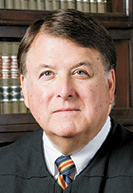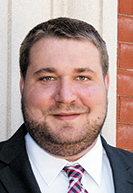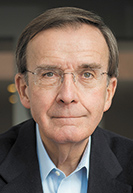Subscriber Benefit
As a subscriber you can listen to articles at work, in the car, or while you work out. Subscribe NowAfter 39 years, G. Michael Witte, executive director of the Indiana Supreme Court Disciplinary Commission, is calling it a career — sort of.
Though he officially retires Friday, Witte will not leave the legal profession entirely. He has plans to apply for senior judge status and intends to continue his advocacy work for Asian-Pacific American attorneys. Even so, he knows the time to step back has come.
“I think probably COVID had some impact on that feeling and recognizing that life is short,” Witte said. “So I decided it’s time to enjoy retirement. I’m in a position where I can, and I want to enjoy it with my family.”
Friday will mark the end of a career that has included private practice, a judgeship, the Disciplinary Commission and positions in national legal organizations. Those who know Witte describe him as hard-working, personable and always willing to do the right thing.

“When you see Mike Witte, you’re glad to see him,” retired Indiana Chief Justice Randall Shepard said.
Winding path
After graduating from Indiana University Robert H. McKinney School of Law in 1982, the first stop on Witte’s career journey was a small general practice. He also worked as a deputy prosecutor before ending up at a place he never expected: the Dearborn County Court.
“I became a judge at a young age, but that was not my career path,” Witte recalled. “It was happenstance, and it was being in the right place at the right time.”
Witte served in the Dearborn County Court from 1985-2000, when he was elected to the Dearborn Superior Court. He stayed on the bench in Dearborn County until 2008 and served briefly on the Wayne Superior Court in 2009. He wouldn’t take the helm of the Disciplinary Commission until June 2010, and in his hiatus, Witte pursued a unique legal interest: serving as a judicial fellow for the National Highway Traffic Safety Administration, a research and education position that allowed him to indulge his interest in traffic law.
When he took the bench in 1985, drunken driving was perceived as an “oops” offense, Witte said, but he believed it was a greater public health issue. The sheer number of drunken driving cases on his docket stood out to him, and when former Indiana Court of Appeals Judge Linda Chezem invited him to an impaired driving program offered by the National Judicial College, his interest blossomed.
Shepard, who has known Witte for 30 years, recalls the former judge teaching other judges about the importance of “smaller” cases involving traffic infractions or small claims issues. Those might not be the high-profile cases, Shepard said, but Witte understood that even “small” cases are a big deal to the litigants involved.
Witte’s interest in traffic law led to his place on the faculty of the National Judicial College at the University of Nevada, Reno, as well as his work with the National Highway Transportation Safety Administration. He also was named chair of the American Bar Association Judicial Division in 2010, a distinction Shepard said has only been held by one other Indiana judge.
Getting to work
When the position of Disciplinary Commission executive director opened in 2010, Witte was hesitant to apply. He was comfortable in his traffic law niche, but he also had an interest in legal ethics. Ultimately, he applied for the job at the urging of friends.
Shepard, who was then Indiana chief justice, was part of the committee that selected Witte for the job. Asked what made Witte stand out, the former chief pointed to his “talent for management and his fervent aspiration to improve the profession both in the courts and the legal profession.”
Some of Witte’s proudest achievements are personal: mentoring young lawyers and advocating for fellow Asian-Pacific American lawyers. Others are professional, including modernizing the case management system that, in 2010, still involved 3-by-5 index cards, as well as the effort to rewrite Admission & Discipline Rule 23. There was also the more recent introduction of advisory and informal ethics opinions, which were introduced under Witte’s watch in late 2018.

But what gets the most attention is the initiative Witte led to clear the backlog of discipline cases he inherited in 2010.
“There was a substantial backlog of cases to the point where I think there may have been one prosecuted that was 10 years old,” said John Higgins, a former law clerk and staff attorney at the Disciplinary Commission who is now a partner at Katz Korin Cunningham.
Back then, the waiting period to get on the commission’s agenda for consideration of charges could be three years, Witte recalled. If charges were brought, it was another 18 months of litigation. If misconduct was a couple of years old when it was reported, that would make the misconduct roughly six years old before a final disposition.
The commission received “justified” criticism for that delay, Witte said. But through efforts that included the move to electronic case management, there were just 24 cases waiting for consideration at the end of 2020.
Judicial perspective
Witte has seen some high-profile discipline cases during his tenure at the commission. He pointed to the cases against former Indiana Secretary of State Charlie White, former Indiana Attorney General Curtis Hill and lawyer-fraudster William Conour.
The Conour case, in particular, garnered criticism from those who said the commission waited too long to act, allowing Conour to defraud more clients. Though he thinks those comments are based on a misunderstanding of the facts, Witte also said criticism of his agency does not play a role in his work, nor does the notoriety of the lawyer-respondent.
“We have taken on the position that we are not impacted in any way by the name or the pedigree of the respondent of the firm that they’re with in making our decisions,” Witte said.

Higgins described his former boss as having thick skin, which he said came from Witte’s experience as a judge. John Krauss, a member of the Disciplinary Commission, has also seen a benefit from Witte’s judicial experience, especially when it comes to examining the nuances of complicated issues.
But Witte admits that some days as executive director have been hard. When he sees a narrative about a case on social media that he knows his false, he can’t step in to correct it. His defense, then, is to ignore those narratives and do his job to the best of his ability.
“Do the right thing, and don’t worry about what people think,” Higgins said, recalling a lesson he took away from Witte. “Ultimately, if you do the right thing, you don’t have to look over your shoulder. It will all work out in the end.”
A new era
As his retirement approaches, Witte has a plan in place. He’s going to apply for senior judge status and make time to spend with his wife and adult daughter. He recalled taking his family to professional events in French Lick, for example, but he said those events aren’t as fun for the family when it’s “business for dad.”
He also plans to stay involved in the Indiana chapter of the Asian-Pacific American Bar Association. Witte has the distinction of being the first Asian-American judge in Indiana, and Shepard said Witte was often ahead of his time on issues of diversity.
As the search for his successor begins, Witte has some suggestions.
First, he would urge whoever takes his place to advocate for creating a pool of uniformly trained senior judges who can serve as hearing officers in discipline cases.
He also quipped another suggestion indicative of the personable man he’s described as: “Get the building manager to work on the thermostat.”•
Editor’s note: This story has been corrected to include a first reference to John Krauss.
Please enable JavaScript to view this content.

